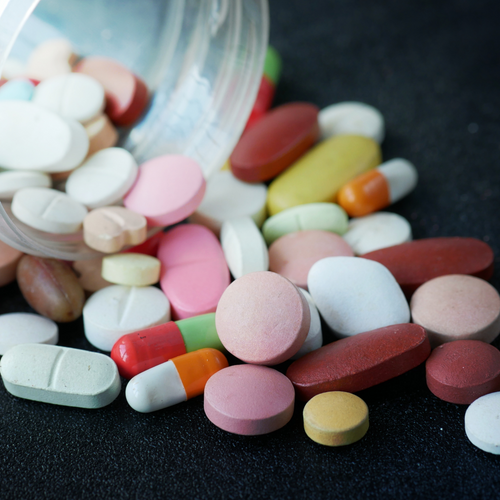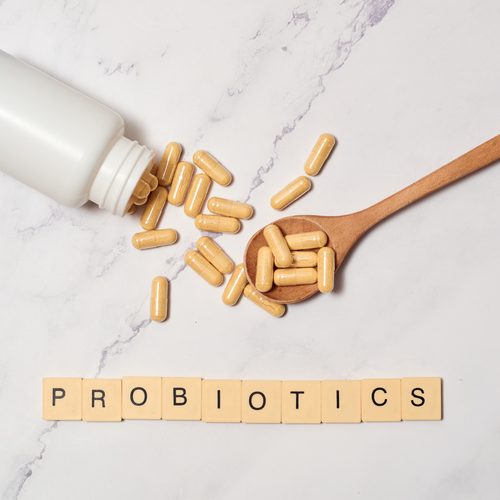Gut microbiota and skin: the impact of diet on pimples
The skin is the largest organ in the human body, which also has its own bacterial flora: the cutaneous flora . It surrounds us to protect us from external aggressions. In close connection with the intestinal microbiota , the skin is a reflection of our inner well-being and therefore in the event of an inner imbalance, whether hormonal or bacterial, the appearance of imperfections is instantaneous.
The 5 foods that promote the appearance of pimples
Although everyone is different, generally speaking, poor eating habits contribute to the appearance of imperfections and spots.
Therefore, there are certain foods that are recommended to be avoided, especially if you have acne-prone skin.
1 - Dairy products
Dairy products aren't always our friends for life. Numerous studies have established a causal link between overconsumption of milk and other dairy products and the development of acne. This is explained by the high level of lactose , a sugar that becomes difficult to digest after childhood and has an impact on our hormonal balance.
2 - Foods rich in refined sugar
This is your sign to do a sugar detox . Be careful, we're not asking you to eliminate all carbohydrates from your diet! The sugars naturally found in fruits, grains, or legumes are essential. These natural sugars are among the macronutrients essential for the proper functioning of our bodies by providing them with the energy they need.
The problem here is obviously the refined sugars found in candy, industrial cakes, and pastries. These sugars , having undergone a chemical process to be purified and decolorized, provide no interesting nutrients, just calories. They are also associated with an imbalance in the intestinal microbiota and a decrease in sensitivity to insulin, the hormone that regulates blood sugar. An overproduction of insulin stimulates the secretion of androgens (male hormones), which in turn leads to excessive sebum production. On your skin, this results in larger and clogged pores, oily skin, pimples, and other imperfections.
3 - Foods with a high glycemic index
The glycemic index is the sweetening power of a food. When it is high, it indicates that it is likely to suddenly increase blood sugar levels. Overconsumption of foods with a high GI (over 70) such as white bread, potatoes, white rice, and sweets is associated with the development of acne .
4 - Foods rich in bad fats
Warning! Eliminating all fat from your diet is a very bad idea: it's not the solution to acne and, above all, it's dangerous for your health. Lipids are essential to our bodies; you just need to know how to differentiate between good fat and bad fat!
Fats to absolutely avoid are:
- Trans fats : found in hydrogenated oils or ultra-processed foods, these fats are pro-inflammatory and therefore promote the appearance of pimples.
- Saturated fats : Found in animal products like meat, butter, cold cuts, and dairy. Acne-causing bacteria love them!
5 - Alcohol
If you see pimples appearing the day after a boozy night out, it's normal! In fact, a recent study showed that ethanol, contained in alcohol, is a powerful trigger for lipogenesis in sebocytes, the sebaceous glands that produce sebum.
In addition, alcoholic drinks, particularly sugary ones, increase insulin levels and promote microbiota imbalance and hormonal imbalance, both of which cause spots.
What foods should you eat for healthy skin?
To achieve healthy skin, it's important to pay attention to what we put into our bodies. A balanced diet rich in nutrients, vitamins, and antioxidants has been shown to have multiple beneficial effects on the skin: a more radiant complexion, more hydrated, and less marked skin.
Drink water
It can't be stressed enough, but healthy skin is hydrated skin, both inside and out. It's therefore recommended to drink at least 1.5 liters of water per day to flush toxins from the body and ensure proper hydration for our skin.
Favor whole grains
To avoid blood sugar spikes and hormonal imbalances, it's recommended to choose whole grains over refined grains, which have a high glycemic index. Instead, opt for grains like quinoa, brown rice, or whole-grain bread, which, in addition to being rich in fiber, provide many essential nutrients.
Think about omega-3s
To combat this inflammatory condition, nothing beats omega-3s, which are powerful anti-inflammatories . Consuming oily fish (salmon, herring, mackerel, etc.), walnut oil, or avocado will help regulate sebum and reduce acne breakouts.
Sweeten differently
Refined sugar should be avoided at all costs; it does nothing for your body except cause breakouts. While it's best to limit your sugar intake in all its forms, there are natural alternatives to sugar: honey, agave syrup, stevia, maple syrup, or even unrefined cane sugar.
Sources :
[1] Kleemann, J., Cinatl Jr, J., Hoffmann, S., Zöller, N., Özistanbullu, D., Zouboulis, CC, ... & Kippenberger, S. (2024). Alcohol Promotes Lipogenesis in Sebocytes—Implications for Acne. Cells , 13 (4), 328.
[2] Melnik, B.C. (2011). Evidence for acne-promoting effects of milk and other insulinotropic dairy products. Milk and Milk Products in Human Nutrition , 67 , 131-145.
[3] Baldwin, H., & Tan, J. (2021). Effects of diet on acne and its response to treatment. American journal of clinical dermatology , 22 , 55-65.
[4] Kawano, Y., Edwards, M., Huang, Y., Bilate, AM, Araujo, LP, Tanoue, T., ... & Ivanov, II (2022). Microbiota imbalance induced by dietary sugar disrupts immune-mediated protection from metabolic syndrome. Cell , 185 (19), 3501-3519.
[5] Coates, M., Lee, M.J., Norton, D., & MacLeod, A.S. (2019). The skin and intestinal microbiota and their specific innate immune systems. Frontiers in immunology , 10 , 2950.














